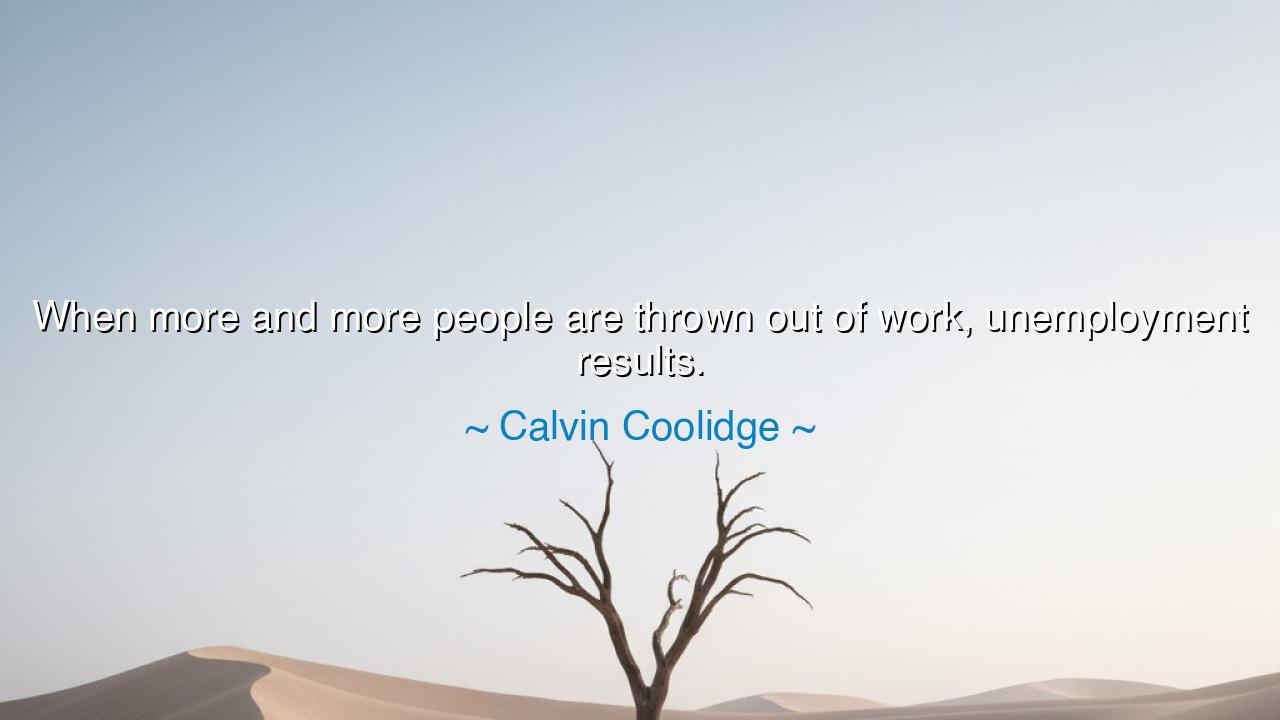
When more and more people are thrown out of work, unemployment






President Calvin Coolidge, often a man of few words, once declared with stark simplicity: “When more and more people are thrown out of work, unemployment results.” Though it may appear plain, within this statement lies the sharp wisdom of clarity—the ability to name what others complicate. For in times of crisis, truth is often buried beneath speeches and theories, yet Coolidge cut through with the blade of the obvious: when men are stripped of work, the shadow of unemployment inevitably rises.
The ancients, too, knew the danger of such times. They spoke of the fall of cities when the fields lay unplowed and the artisans sat idle, of nations weakened not by enemies at the gates but by hunger and despair within. Work is more than toil; it is the lifeblood of a people, the bond between individual and community. To be cast out of labor is not merely to lose coin, but to lose purpose, dignity, and the rhythm of life itself.
Coolidge’s bluntness carries a hidden power. By reducing the matter to its essence, he reminds us that unemployment is not a distant abstraction but the direct fruit of casting aside the worker. When “more and more people” lose their place, the fabric of society unravels, thread by thread. Thus, his words are not only a statement of fact, but a warning: neglect the laborer, and the house of the nation will not stand.
It is also a call to humility for leaders and rulers. For often they clothe their failings in complex rhetoric, but Coolidge’s wisdom strips all pretenses: the problem is plain, and so must be the remedy. Ensure work, and you ensure stability. Cast away the worker, and chaos will follow. In his brevity lies the eternal teaching that truth does not always need grandeur, but courage to speak the obvious.
Let the generations remember: work is the anchor of civilization. To honor it is to preserve strength; to neglect it is to invite decline. Coolidge’s words, simple yet unyielding, echo the voice of the ancients—guard the labor of the people, for in it rests not only bread, but dignity, peace, and the endurance of nations.






HL14. Phan Thi Hong Loan
The cause and effect laid out here seem straightforward, but does this imply we need more safety nets and job security? With economies shifting so fast, the idea of a traditional 9-to-5 job is rapidly changing. Maybe what we need isn't just employment, but a rethinking of how work is structured and supported. Could that be the real solution to the problem that Coolidge pointed out?
TNtrang nguyen
I’ve been thinking about how this could apply to modern times. With the rise of the gig economy, fewer people are having traditional full-time jobs, so does unemployment even look the same anymore? Is it possible that many of these people are still working, but under different conditions that don’t count as ‘employed’ in the traditional sense? That opens up a lot of questions about how we define work and unemployment today.
LLinh
This quote almost seems to oversimplify the issue. While unemployment can be caused by job loss, there are also other factors like wage stagnation, inflation, and skill mismatches that contribute. Can we really say that unemployment only results from layoffs? Is it not more complex, with multiple contributing factors that need to be addressed simultaneously?
LTLinh Thuy
It's interesting how this quote points to a direct cause and effect between layoffs and unemployment. In today’s context, could this still be true when automation and AI are replacing jobs? I wonder if new job markets are being created at the same time, or if society is just struggling to keep up with the changes. Does that mean it’s just a matter of economic transition rather than a real crisis?